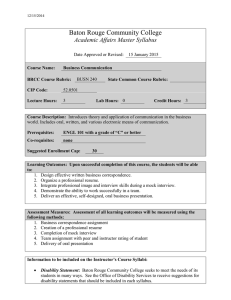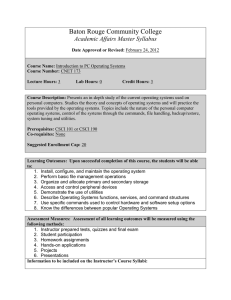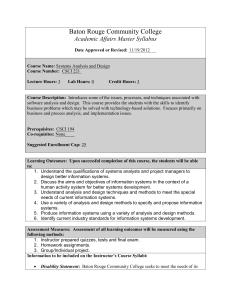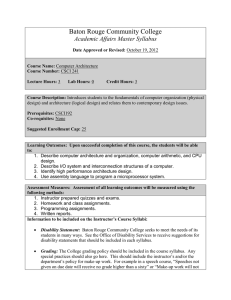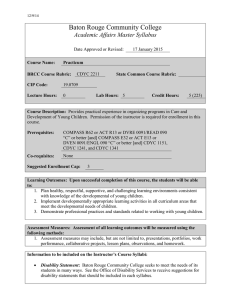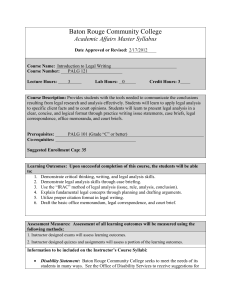Baton Rouge Community College Academic Affairs Master Syllabus
advertisement
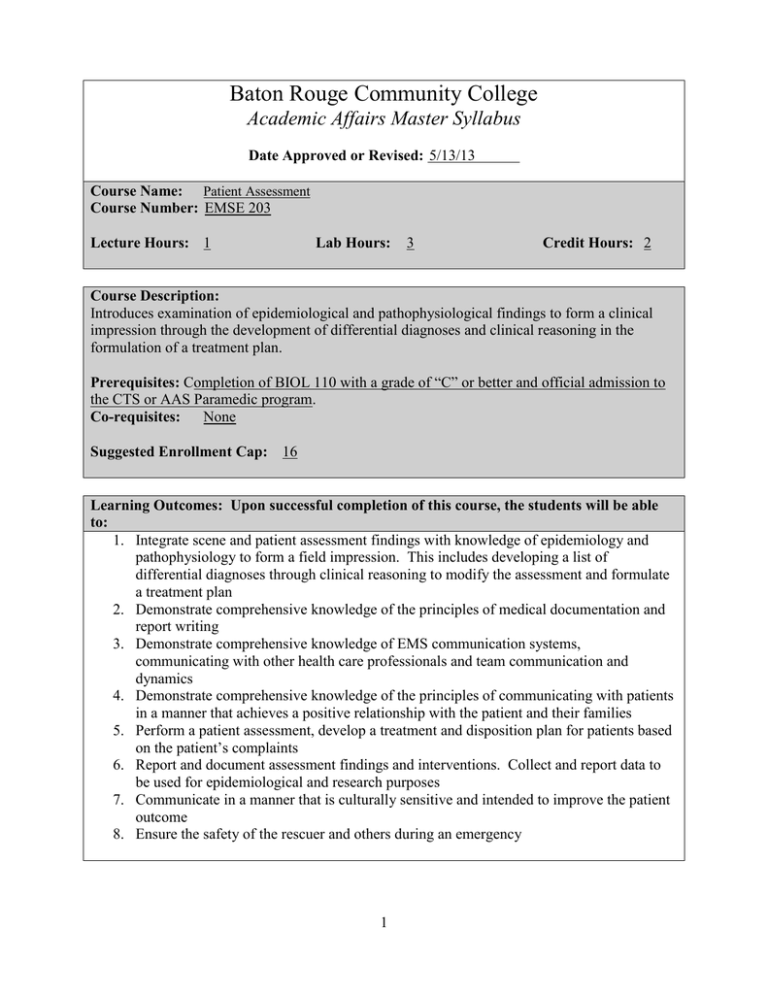
Baton Rouge Community College Academic Affairs Master Syllabus Date Approved or Revised: 5/13/13 Course Name: Patient Assessment Course Number: EMSE 203 Lecture Hours: 1 Lab Hours: 3 Credit Hours: 2 Course Description: Introduces examination of epidemiological and pathophysiological findings to form a clinical impression through the development of differential diagnoses and clinical reasoning in the formulation of a treatment plan. Prerequisites: Completion of BIOL 110 with a grade of “C” or better and official admission to the CTS or AAS Paramedic program. Co-requisites: None Suggested Enrollment Cap: 16 Learning Outcomes: Upon successful completion of this course, the students will be able to: 1. Integrate scene and patient assessment findings with knowledge of epidemiology and pathophysiology to form a field impression. This includes developing a list of differential diagnoses through clinical reasoning to modify the assessment and formulate a treatment plan 2. Demonstrate comprehensive knowledge of the principles of medical documentation and report writing 3. Demonstrate comprehensive knowledge of EMS communication systems, communicating with other health care professionals and team communication and dynamics 4. Demonstrate comprehensive knowledge of the principles of communicating with patients in a manner that achieves a positive relationship with the patient and their families 5. Perform a patient assessment, develop a treatment and disposition plan for patients based on the patient’s complaints 6. Report and document assessment findings and interventions. Collect and report data to be used for epidemiological and research purposes 7. Communicate in a manner that is culturally sensitive and intended to improve the patient outcome 8. Ensure the safety of the rescuer and others during an emergency 1 Assessment Measures: Assessment of all learning outcomes will be measured using the following methods: 1. Instructor designed exams will collectively assess a portion of the learning outcomes and will be administered during the semester as listed in the course syllabus. 2. Instructor designed comprehensive final exam will assess a portion of the learning outcomes and will be administered at the end of the semester. 3. Instructor designed clinical/lab competency tool will be used to assess a portion of the learning out comes and will be administered as listed in the course syllabus. Information to be included on the Instructor’s Course Syllabi: Disability Statement: Baton Rouge Community College seeks to meet the needs of its students in many ways. See the Office of Disability Services to receive suggestions for disability statements that should be included in each syllabus. Grading: The College grading policy should be included in the course syllabus. Any special practices should also go here. This should include the instructor’s and/or the department’s policy for make-up work. For example in a speech course, “Speeches not given on due date will receive no grade higher than a sixty” or “Make-up work will not be accepted after the last day of class.” Attendance Policy: Include the overall attendance policy of the college. Instructors may want to add additional information in individual syllabi to meet the needs of their courses. General Policies: Instructors’ policy on the use of things such as beepers and cell phones and/or hand held programmable calculators should be covered in this section. Cheating and Plagiarism: This must be included in all syllabi and should include the penalties for incidents in a given class. Students should have a clear idea of what constitutes cheating in a given course. Safety Concerns: In some programs this may be a major issue. For example, “No student will be allowed in the safety lab without safety glasses.” General statements such as, “Items that may be harmful to one’s self or others should not be brought to class.” Library/ Learning Resources: Since the development of the total person is part of our mission, assignments in the library and/or the Learning Resources Center should be included to assist students in enhancing skills and in using resources. Students should be encouraged to use the library for reading enjoyment as part of lifelong learning. 2 Expanded Course Outline: Patient Assessment 1. Scene Size-Up I. Scene Safety II. Scene management 2. Primary Assessment I. Primary Survey/Primary Assessment II. Integration of treatment/procedures needed to preserve life III. Evaluating priority of patient care and transport 3. History Taking I. Components of the patient history II. Interviewing Techniques III. Components of the patient history IV. Cultural Competence V. Special challenges VI. Integration of therapeutic communication, history taking techniques, patient presentation and assessment findings; Development of field impression VII. Treatment Plan; Modify initial treatment plan VIII. Age-related considerations 4. Secondary Assessment I. Techniques of Physical Examination II. Physical examination techniques will vary from patient to patient depending on the chief complaint, present illness, and history III. Physical examination – approach and overview IV. Mental Status V. Techniques of Physical Exam: General Survey VI. Vital Signs VII. Examination by anatomical region or system VIII. Modifying the assessment for the patient with a life threatening emergency 5. Reassessment I. How and When to Reassess II. Patient Evaluation: Reassessment III. Documentation IV. Age-related Considerations 6. Documentation I. Principles of medical documentation and report writing 7. EMS System Communication I. EMS Communication System II. Communicating with other health care professionals III. Team communication and dynamics 8. Therapeutic Communication I. Principles of communicating with patients in a manner that achieves a positive relationship 3

